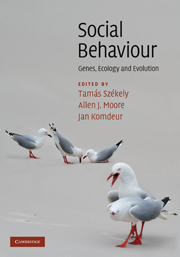Book contents
- Frontmatter
- Contents
- List of contributors
- Introduction: The uphill climb of sociobiology: towards a new synthesis
- Profile: Undiminished passion
- Part I Foundations
- Part II Themes
- Part III Implications
- 16 Personality and individual social specialisation
- Profile: Behavioural ecology, why do I love thee? Let me count the reasons
- 17 Molecular and genetic influences on the neural substrate of social cognition in humans
- Profile: Anonymous (and other) social experience and the evolution of cooperation by reciprocity
- 18 Population density, social behaviour and sex allocation
- Profile: Social theory based on natural selection
- 19 Social behaviour and speciation
- Profile: Look to the ants
- 20 Social behaviour in conservation
- Profile: The handicap principle and social behaviour
- 21 Prospects for research in social behaviour: systems biology meets behaviour
- Species index
- Subject index
- References
Profile: Anonymous (and other) social experience and the evolution of cooperation by reciprocity
Published online by Cambridge University Press: 05 June 2012
- Frontmatter
- Contents
- List of contributors
- Introduction: The uphill climb of sociobiology: towards a new synthesis
- Profile: Undiminished passion
- Part I Foundations
- Part II Themes
- Part III Implications
- 16 Personality and individual social specialisation
- Profile: Behavioural ecology, why do I love thee? Let me count the reasons
- 17 Molecular and genetic influences on the neural substrate of social cognition in humans
- Profile: Anonymous (and other) social experience and the evolution of cooperation by reciprocity
- 18 Population density, social behaviour and sex allocation
- Profile: Social theory based on natural selection
- 19 Social behaviour and speciation
- Profile: Look to the ants
- 20 Social behaviour in conservation
- Profile: The handicap principle and social behaviour
- 21 Prospects for research in social behaviour: systems biology meets behaviour
- Species index
- Subject index
- References
Summary
Animals behave according to their previous social experience. This has been demonstrated in a wide range of species all across the animal kingdom (Rutte et al. 2006). Remarkably, this response to previous social interactions is not confined to experience with known individuals. It appears to be a much simpler trait than we might assume from our own intuition. If an animal fights with any conspecific, it will behave differently in future encounters, depending on whether it won or lost. These renowned winner and loser effects are among the most predictable traits in animal interactions (see Chapter 14). In humans, we term the psychological mechanism involved ‘self-confidence’. But, most interestingly, animals respond contingently upon social experience also in a sociopositive context. If they received help, they are more likely to help others as well, even if donors and receivers are completely unknown to each other. This generalised form of reciprocity has been demonstrated in humans and Norway rats so far (Bartlett & DeSteno 2006, Rutte & Taborsky 2007), but we assume it to be a general phenomenon, just like the ubiquitous winner and loser effects.
In the early 1970s, after Hamilton's (1964) and Trivers' (1971) revelations on kin selection and reciprocity as key mechanisms of altruistic behaviour and advanced sociality, we were tempted to believe that the major riddles in this field had been solved. The vast literature that emerged on the evolutionary mechanisms of altruism and (eu)sociality since then, at both theoretical and empirical levels, proved us dead wrong.
- Type
- Chapter
- Information
- Social BehaviourGenes, Ecology and Evolution, pp. 470 - 473Publisher: Cambridge University PressPrint publication year: 2010

